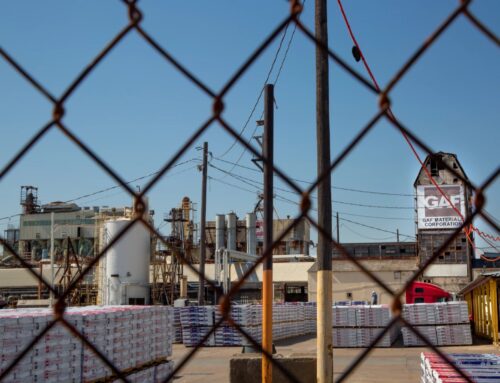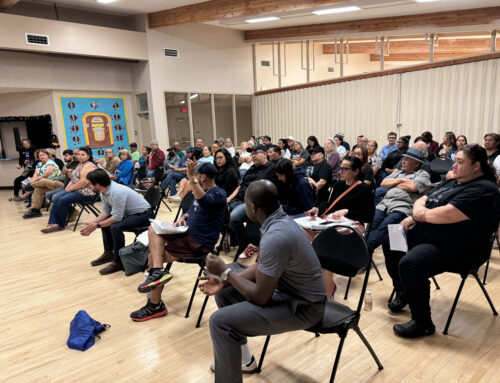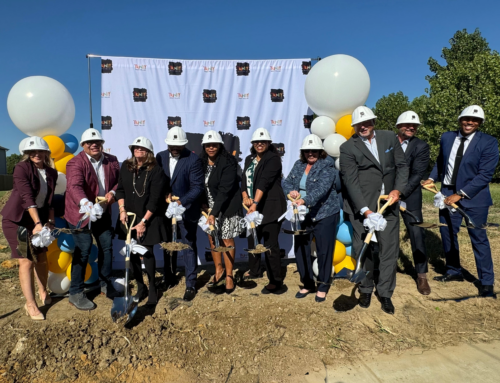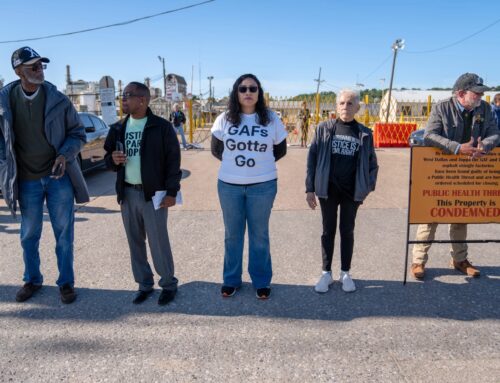How West Dallas residents are challenging the industries polluting their neighborhood
West Dallas residents have set the stage to challenge GAF’s federal permit renewal and reimagine the Singleton corridor without smog, smells and health anxieties.
GAF is North America’s leading roofing manufacturer and one of West Dallas’ leading sources of air pollution. After months of petitions, meetings and teamwork among neighborhoods and nonprofits, West Dallas residents have been granted a public hearing with the Texas Commission on Environmental Quality (TCEQ) about GAF this Thursday, July 29 at 7 p.m.
Starting in February, several West Dallas groups organized to push back against GAF’s presence in their community when its federal permit came up for its five year renewal. Legal Aid of Northwest Texas helped collect comments on behalf of the West Dallas 1 neighborhood coalition and environmental advocacy organization Downwinders at Risk created a public comment template that was used more than 50 times to request a public meeting about the GAF permit renewal.
On July 13, Legal Aid of Northwest Texas and West Dallas 1, a grassroots advocacy group, held a neighborhood meeting at Wesley Rankin Community Center to discuss air pollution along the Singleton corridor.
Representatives from Legal Aid guided the audience through West Dallas’ air pollution challenges and greatest areas of environmental concern: The huge quantities of sulfur dioxide, which contribute to acid rain and lung problems, and particulate matter coming from industry.
Particulate matter is classified as PM10 or PM2.5 based on size, with smaller particles being more dangerous. PM2.5 refers to particles in the air that are less than 2.5 microns thick, which is about 30 times smaller than the width of a human hair. PM2.5 can travel deep into the lungs and bloodstream because the body isn’t adapted to filter out such small things. This can cause short -term irritation or long-term harm to people’s respiratory tract, increasing the risk of complications including lung cancer and heart disease.
GAF produced an average of 61 tons of particulate matter and 122 tons of sulfur dioxide per year, based on the company’s self-reported emissions estimates. These values are not directly measured, resulting in issues such as reported PM10 concentrations being conflated with reported PM2.5 concentrations.
“The data doesn’t work,” Stephanie Champion, a Legal Aid attorney, told those who gathered at the neighborhood meeting. “These industrial pollution sources are likely not accurately monitoring, measuring or reporting their emissions. The only way we can really know is to take matters into our own hands.”
Currently there are only six EPA monitors for particulate matter air pollution in North Texas. To collect more data, West Dallas organizers installed their own Purple Air brand monitors, which transmit PM2.5 concentrations over WiFi to a real time air quality map. Still, there are only eight actively reporting Purple Air monitors within Dallas. Five are in West Dallas, three of which were installed in the last couple of weeks.
Presenters from Legal Aid of Northwest Texas suggested residents keep a journal to record any smells and the time of day they occurred, as well as taking pictures of visible pollution. Sulfur smells are akin to a rotten egg-like odor. Legal Aid’s goal is to empower citizens to make their own air quality reports directly to TCEQ.
Champion emphasized that TCEQ depends on citizen complaints to prompt investigation. Very few formal complaints had been made about the GAF plant until Legal Aid of Northwest Texas got involved.
“A lot of folks didn’t know to contact TCEQ, and even those who did didn’t have faith in the process or that anything was going to come of it. Folks would call 311 without knowing how to issue a complaint to 311,” Champion says. “But we definitely want those complaints going directly to TCEQ.”
Concerns over active air monitoring have been at the center of another project around North Texas. The SharedAirDFW Network is a collaboration between the University of Texas at Dallas, Downwinders at Risk, the City of Plano, Dallas County, Dallas College and Paul Quinn College working to install more than 100 more particulate matter monitors in the region over the next one to two years. The first wave of the initiative intends to add 11 air monitors in West Dallas.
West Dallas historically has faced challenges from industrial zoning existing near homes and releasing emissions into the air, water and soil. Zoning is the tool the City of Dallas uses to determine what can be built or operated on a particular piece of property. At the community meeting, Evelyn Mayo presented on the Neighborhood Self-Defense Project, which aims to create a comprehensive land use plan based on residents’ input.
The project currently is focused on information gathering, in part through an ongoing survey. Of the approximately 100 responses it has received so far, over half of respondents said they’ve had issues with smell from industry.
In a press release from West Dallas 1 and the Neighborhood Self-Defense Project, the groups compared the environmental justice issues posed by GAF to the lead smelters that operated in West Dallas until they were closed in the 1980s. West Dallas 1 president Raul Reyes Jr. referred to GAF as “the new RSR” lead smelter, which also were violating air pollution standards when the City of Dallas began to seek its closure in the 1970s, the press release states.
Organizers also decried GAF’s lack of appropriate permits to operate an industrial plant on the land — a trait it also shares with RSR, according to the press release. It claims that research of City Hall documents by Neighborhood Self Defense Project staffers show that GAF doesn’t have a current Certificate of Occupancy or the Special Use Permit (SUP) from the City of Dallas it needs to operate on the property.
At the neighborhood meeting, community members asked about the stance of local nonprofits. Residents called for churches, schools, educational programs and other neighborhood institutions to spread the word.
“The nonprofits are really heavy in our community, and they’re doing a great job with our children. But that’s resources and programming — the environment is just as important,” Ronnie Mestas, a longtime West Dallas resident, said at the neighborhood meeting. “We’re losing alumni, classmates and family every day. It’s time to ask them for a commitment, like some kind of support or letter.”
Comments about GAF’s federal permit renewal can be sent to TCEQ electronically through their online portal or in writing until July 29. The permit hearing will happen via webcast and telephone on Thursday, July 29 at 7 pm. The webcast can be accessed by following this link and entering Webinar ID 192-616-739; there will be an option to send and receive audio through the computer or by phone. For those without internet access, call (512) 239-1201 at least one day before the hearing for assistance in participating in the meeting wholly by phone. TCEQ recommends joining the webinar and registering for the hearing by 6:45 pm on July 29.
The hearing will start with a 30 minute informal open discussion with TCEQ staff and GAF representatives about their permit application. After that will be the formal notice and comment hearing, where the public can speak to their concerns about GAF’s operation. Issues raised in the hearing period will be addressed in the final response to comments sent after the meeting.
Further details have been made available by TCEQ at this link.
Share This Story, Choose Your Platform!
Sona Chaudhary is a Dallas-based geologist, writer and journalist working on environmental justice issues in Dallas and throughout the Southwest United States.
“I want to be involved in Dallas, and I want to help make it better,” Chaudhary says. “I think Dallas Free Press is the greatest learning opportunity there could be, amplifying the voices of people involved in some radical, empathetic and transformative work on the local level.”
In addition to writing for environmental change, Chaudhary is a physical scientist at the Environmental Protection Agency. They are a Cancer Sun, Aries Moon fueled by chai tea.
Areas of Expertise:
environmental justice
Location Expertise:
Dallas, Texas
Official Title:
Environmental Justice Freelance Reporter
Email Address:
sona@dallasfreepress.com





